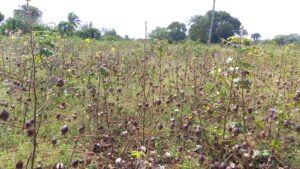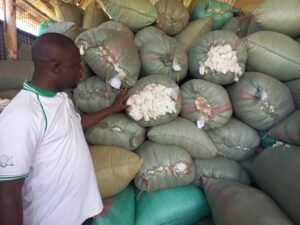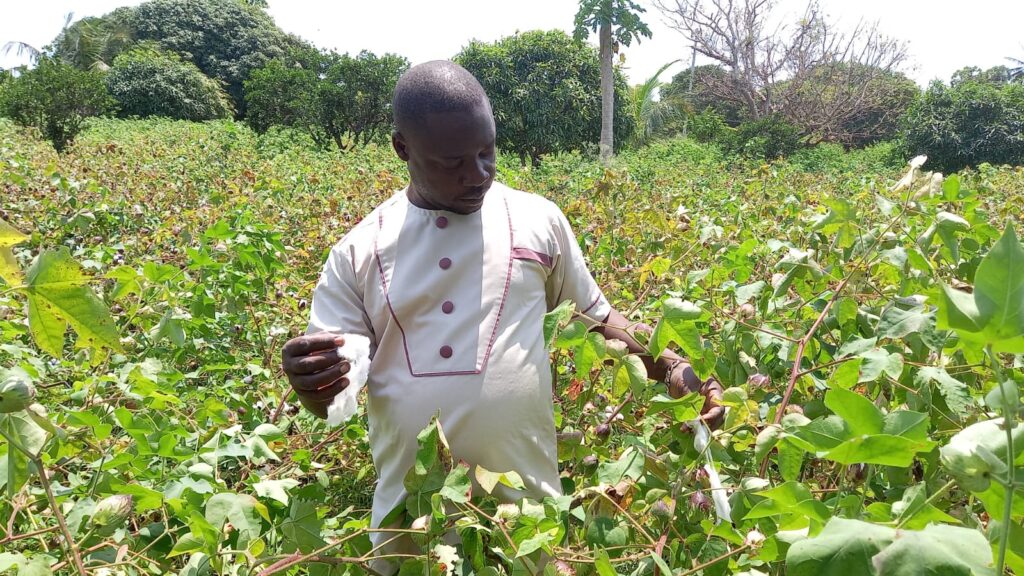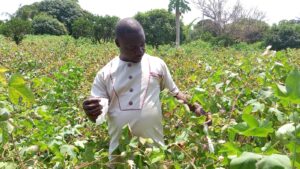A group of women welcome us gently as we arrive at Jackson Ndurya’s farm located in Kinondo village in the outskirts of Msambweni in Kwale County. As we are ushered into the vast compound, we notice that some students which we later learn have come for an agricultural field day to learn the practical skills of farming.
Mr. Ndurya is a man on a mission. His aim… to transform the lives of the community in Kwale through agriculture. As the Chairman of one of the largest marketing co-operative societies in Kwale (PAVI Co-operative, an acronym for Pamba na Viazi) he says he feels obligated to have the community embrace agriculture not only as a source of food, but also as an alternative means to gain employment through commercial agriculture.
Why do we inquire…and not just farming but cotton farming? “Because it’s cheap to maintain. It is manageable because the crop is not easily attacked by pests and it fetches good prices in the market,” states Ndurya.
“Also, the soil in Kwale makes the cotton grow well,” he adds.
The Kwale Cotton Project which is supported by Australian owned, Kwale based mining company Base Titanium through the support of Business for Development B4D and PAVI Co-operative is slowly upping the fortunes of many smallholder farmers in County.
“The project has been able to offer the community stability and long-term economic opportunities that are not dependent on mining by building a productive value chain to meet the growing global demand for ethical cotton,” a report by Base Titanium parent company Base Resources on Sustainability projects by the mining company states.
“The project teaches farmers modern skills and techniques to reduce the risk of crop failure and increase yields. The impact on the Kwale community has been significant with over 1,700 farmers supported to grow, harvest and sell cotton since the program commenced,” says the report.
 As the Chairman of PAVI Ndurya has had the daunting task of promoting cotton farming in a County that has always relied on food crops such as maize and other cereals for consumption.
As the Chairman of PAVI Ndurya has had the daunting task of promoting cotton farming in a County that has always relied on food crops such as maize and other cereals for consumption.
For this he has to lead by example. In his 10 acre piece of land Ndurya has been able to intercrop cotton with maize and other crops.
“I lead a co-operative and I need to show people that its possible to make money out of agriculture,” he says.
For residents of Ngathini village in Lunga Lunga Sub-County efforts to revive the once thriving cotton sector by Base Titanium in partnership with Business for Development couldn’t come at a better time.
Cotton has a rich history in Kwale having been one of the key cash crops that used to be grown in the 1980,s
For Mama Anna the revival of Rivatex has brought back hope that she might once again be able to reap big from farming the crop.
“It has been a long time coming. We have been waiting for the revival of the industry so that we can go back to planting the crop,” she said.
When the Coast Times visited her in her farm she was just from tending her maize crop after wild boers invaded the farm and ate part of her maize crops. Her farm is just 200 metres from the border of Tanzania.
“If you see the crop it can sustain the weather. The soil is rich and cotton usually does well unlike other crops,” she says.
Mama Anna started planting cotton four years ago. This is after a two decade hiatus from farming the crop due to lack of market and sustainable partner to encourage small scale farmers.
It was only after Base Titanium, through their agricultural experts, came on board that they convinced her that cotton farming was still a viable business venture for small scale farmers.
“The last time I actively planted cotton was in 1989. Those were the days when cotton was one of the key cash crops in Kwale. I had a flourishing farm and the proceeds were positive. In the 80,s lorries used to park outside my shop just loading bales of cotton. All my children went to school because of cotton farming,” remembers Mama Annah.
“We have been waiting for a partner who will turn the fortunes of cotton farmers once again. But I definitely had lost hope. It was only after officials from Base Titanium came in that I felt I should give it a try once more and see what will happen, actually I see a bright future for many farmers in Kwale.” Said Mama Annah.
Especially now with the re-opening of Rivatex and other cotton processors such as Thika Cotton Mills, Bedi Investments and Ken Knit factories. And even after the revival of the plant, focus has now turned to the crop. Who will encourage the farmers who cleared their cotton bushes to take up their hoes and plant them once again.
Simon Mutuku, another small holder farmer under the Kwale Cotton Project says the project has helped a lot of farmers in Ngathini to make ends meet.
“At first I was skeptical but I later came to realize that cotton was doing very well in these areas. I have intercropped the cotton with maize in my six-acre farm and am now able to plant food crops and also gain money from the cotton,’ said Mr Mutuku.
He said: “When we started we were only 3 farmers, but we have progressively been increasing with more farmers embracing the project. We now have 20 members in Ngathini.”
Base’s efforts in supporting the revival of the cotton industry started in 2014 when it engaged Business for Development to look into ways of improving agricultural productivity in Kwale.
Trials were undertaken in 2014 to test the economics of cotton farming in Kwale and to determine cotton lint quality including fibre strength and colour and to select suitable varieties that could do well in Kwale.
Successful yields and excellent quality provided strong indication that this crop had the potential to become an important contributor to agricultural livelihoods in the region, especially considering that cotton used to be a major cash crop in the region before the industry collapsed in the early 90’s.
The cotton programme is having a positive impact in many parts of Kwale County, including the host resettlement site, communities adjacent to the mine and now supports 2,500 small scale farmers who are involved in cultivating about 1,500 acres of cotton.
In partnership with Cotton On, Business for Development and the support of the national and county government, Base hopes to expand the Kwale Cotton Programme to 10,000 farmers.
To support the farmers to market their produce, Base Titanium supported the community in Kwale to establish a farmer’s cooperative society to help create a direct links to markets and increase their collective buy and selling power hence the formation of the PAVI Co-operative Society an acronym for Cotton and potatoes in Swahili (Pamba na Viazi).
Established in 2016, PAVI Co-operative Society has been working hand in hand with Base Titanium to improve food security in Kwale by offering farmers capital, extension services, raw materials and providing markets for farm produce.
“The logic behind the co-operative was to start a farmer’s organization which is farmers-owned and led so as to continue the livelihood projects even after Base winds up mining operations in Kwale,” Jackson Ndurya who is also a founding member tells Coast Times.

The cooperative society that started off with only 20 members has expanded, accommodating more than 5500 members involved in the planting cotton, sorghum, millet, highland rice, maize, green grams among others.
With the help of the mining company and members’ contribution the cooperative society oversees seeds distribution, crop production and marketing of produce.
“Our focus has shifted from production for our own consumption to production for commercial purposes. That is why we have introduced cash crops like cotton and potatoes.” he said.
The co-operative has also been attracting funding and support to conduct their activities from various stakeholders including the National Government through the Ministry of Agriculture under the National Agricultural and Rural Inclusive Growth (NARIGP) Project (which is a partnership with the World Bank) which has expressed interest in setting up a cereals processing plant in Kwale.
The State Department of Industrialization on the other hand has also approved the construction of a Ginnery at PAVI Business Park, while the Kenya Cereal Enhancement Program (KCEP CRAL) has plans to build a storage facility at the park.
“The PAVI concept is about Good Agriculture produce because farmers had been doing the same farming at the same time therefore making the price of flooded commodities go down year in year out but now they have changed the traditional farming methods,” he said.
LOANS
He said that PAVI nowadays contracts its members to do farming and therefore they are guaranteed to be paid for what they are growing unlike other farmers.
“I can tell you farmers are happy with this approach and that is why the number is increasing every day. We make sure that farmers have a smile on their face as they do farming,’ he added.
Through soft loans provided by PAVI to its members, farmers are able to sort out school fees issues and other emergencies.
“Apart from that we offer advance payment to farmers who have been contracted to do farming for various crops and this has encouraged them. It is a very good approach,” he noted.
Through agricultural extension officials who do monitoring and offer advisory services to PAVI farmers in Matuga,Msambweni and LungaLunga sub-counties, youths are able to get job opportunities.
He said that cotton farming is proceeding well with already 35 tons harvested in 2022 from 11 tons in 2021 where about 250 active farmers were engaged out of 5,500.
Value addition
In a bid to ensure that there are no leftovers after harvesting PAVI is also formulating animal feeds from various crops harvested by its members including maize and sorghum and sell it at a cheaper price to farmers in Kwale.
Just like hundreds of other cotton farmers, Kilalo Ramadhan, a retired teacher said that cotton farming is cheaper and better than other crops since nobody is interested in stealing it.
“When you compare cotton farming and maize or other crops cotton is far much better because no thief will think about it or baboons the only issue will be dealing with pests,” he added.
Kilalo said that cotton farming is the next economic frontier that requires farmers in Kwale to embrace it by first joining the PAVI cooperative society.
Due to support by Base Titanium through support of its staff and media publicity PAVI has attracted various investors including Australian Center for International Research (ACIAR) Eddy Chibu notes.
He said that setting up the cotton ginnery in Kinondo-Kwale will help Coastal line cotton farmers who are forced to take their cotton to Makueni ginnery.
“You see that the plant being here is better because of its proximity to the Kilindini harbor where SGR can easily transport processed cotton products to other areas like Rivertex Company,” he said.



